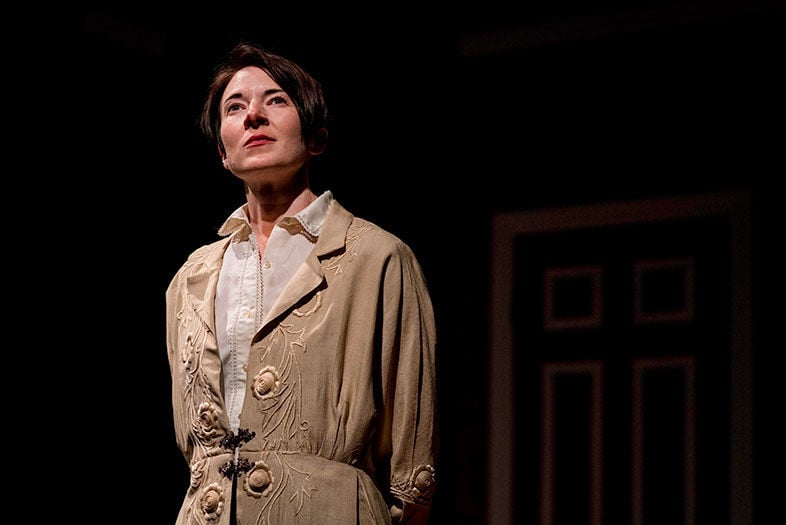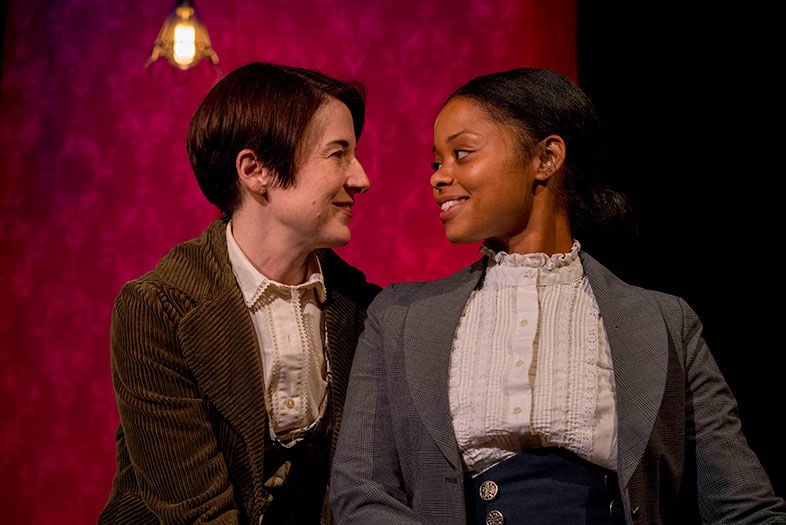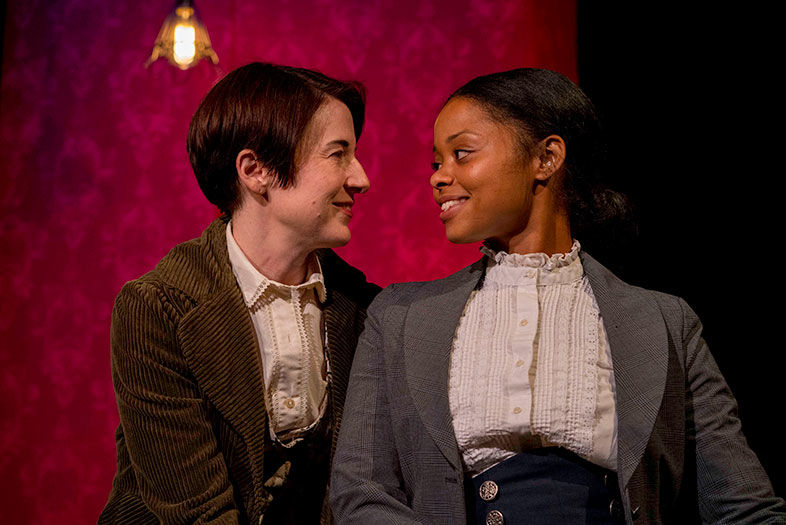My sinking feeling set in early, when Bull in a China Shop seemed to misunderstand its own title metaphor. The play is a purposely anachronistic telling of the relationship between suffragists Mary Woolley, president of the all-women Mount Holyoke College, and Jeannette Marks, her clandestine love and former student. Woolley (Jo Anne Glover) makes an unapologetically bold, thesis-statement entrance declaring that she’s a bull in a china shop, here to disrupt the status quo and encourage her students to be “fully evolved human beings” rather than “good pious wives.”
It’s a promising start that rallies us to her cause, but my semantics-picking radar couldn’t help noticing that said proverbial bull doesn’t mean to wreck the china shop. As far as I understand the phrase (your mileage may vary), a bull has neither awareness of nor malice toward the capitalist establishment; it’s a ponderous, uncomfortable animal in a space where it doesn’t belong, so it can’t help but break everything by accident. By the time that Woolley replies to “You want a revolution?” with “I am a revolution,” I can’t help hearing Tywin Lannister’s disappointed quip, “Any man who must say ‘I am the king’ is no true king.” These are only quibbles over individual lines, but they’re symptomatic of a book that’s so eager to saddle its characters with Great Importance that it can spare no time to give them human dimension.
I want to like this story. Playwright Bryna Turner approaches it as an “excavation of queer history,” bringing greater recognition to a lesbian couple who were influential in first-wave feminism. And there are fascinating ideas at work. Woolley finds herself having to make compromises to her vision once she’s accountable to the school’s board and donors; Marks (Tamara McMillian) remains a true believer in those ideals; but she in turn is uncomfortable that her own student, Pearl (Andréa Agosto) is so enamored of her that she’s fallen into the political trap of following personality rather than policy (at least, this is my reading of their dynamic). Exploring this tri-generational relationship between students and teachers, and the mutability of progressive thought in educational institutions, might have been enough in itself for a 100-minute play, but here it’s just one direction of many in which the characters are stretched.
We’re dropped into Woolley and Marks’s relationship about ten years in and given little sense of what they mean to each other before arguments—over their positions at the school, their living situation, the former’s agenda—become practically the only vehicle for advancing their story. Our two leads speak unnaturally, but that’s not the actors’ fault: they have mountains of dialogue to recite, in that perfectly witty, rapid-fire style that’s familiar to idea-driven work. It’s possible to succeed at this with razor-sharp writing and an admission that the people are incidental—see Rosencrantz and Guildenstern Are Dead, etc.—but here we’re expected to care about these women as individuals, though the dialogue leaves barely any room for them to react and arrive at their next thought organically.

‘Bull in a China Shop’ Reaches But Doesn’t Grasp
Jo Anne Glover in Bull in a China Shop | Photo: Daren Scott Photography
The secondary characters are allowed to breathe a little more. Philosophy professor Felicity (Maybelle Covington) brings welcome humor, and Pearl, scorned in the aftermath of a breakup, has an explosively melodramatic monologue that is lyrically impressive despite the air of writer self-indulgence. Finally, poor Dean Welsh (Milena (Sellers) Phillips) is given almost nothing to do except be concerned and represent a fourth generation of the teacher-student chain, an irredeemable anti-boat-rocker.
I admire the desire to use anachronistic language and attitude to heighten contemporary relevance in a period piece, but this play is so saturated with it that, for me, it muddies the view of Woolley and Marks’s relationship. Are we supposed to understand it by today’s terms, or by the 1910s’? If the point is that everything they’re dealing with remains unsolved to this day, what do we make of the blind spot of casting mostly women of color—at the playwright’s suggestion—but never once acknowledging race in the work, let alone how much more complex their story would have been had they actually been an interracial couple? Either way, ending the production by playing an audio clip of a Black Lives Matter protest feels tacked on and unearned.
I don’t for a moment doubt the considerable talents of everyone involved at Diversionary Theatre, and respect their mission to stage provocative, challenging work that highlights queer voices, but it seems to me that the problems inherent to this Bull would be too much for any company to wrangle.
Bull in a China Shop
Directed by Kim Strassburgerâ
Diversionary Theatre, University Heights
Through October 14

‘Bull in a China Shop’ Reaches But Doesn’t Grasp
Jo Anne Glover and Tamara McMillian in Bull in a China Shop | Photo: Daren Scott Photography

















